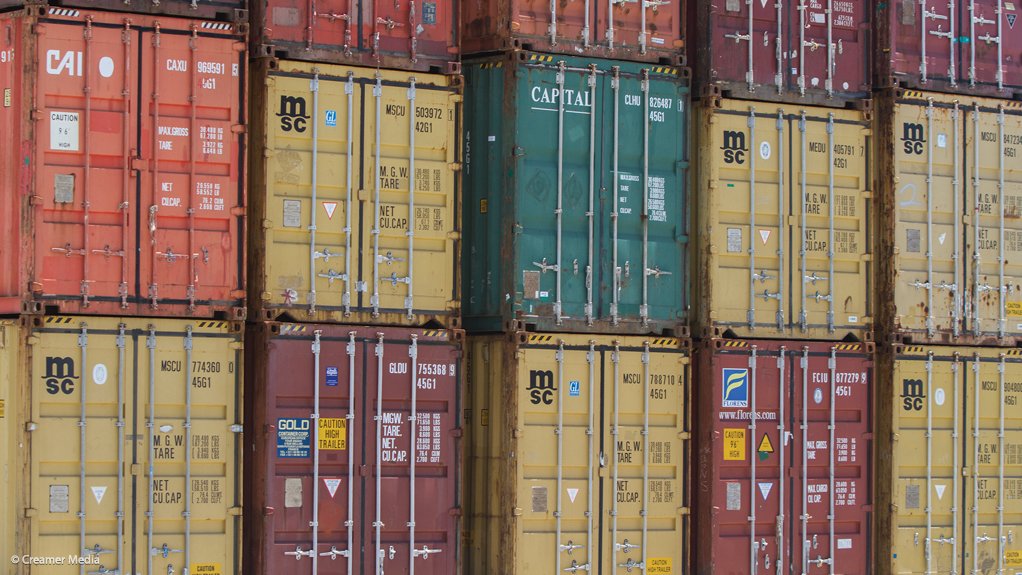America’s application of tariff-setting formula ‘hugely inflated’ South Africa’s trade surplus
South Africa’s trade surplus with the US, which was used to calculate the ‘Liberation Day’ tariffs announced by US President Donald Trump, has been “hugely inflated”, says Professor Lawrence Edwards, of the University of Cape Town’s School of Economics.
Speaking during a webinar hosted by XA Global Trade Advisors, Edwards said that, while the initial expectation was for the US to impose reciprocal tariffs to close the gap between the less than 8% duties imposed by South Africa on American products and US tariffs, the Trump administration had instead based the 30% outcome on its calculation of America’s trade deficit with South Africa.
In applying the formula, however, the administration neglected to take account of any trade in services, where the US enjoys a sizeable surplus over South Africa.
In addition, it included gold processed in South Africa that did not originate in the country and made no accommodation for exempted products, which are mostly minerals, nor those exports covered under Section 232 of the US Trade Expansion Act.
Besides the 30% tariffs imposed on a broad range of South African products, including key agricultural exports such as citrus, the US has also implemented Section 232 tariffs of 25% on all automotives, automotive components, steel and aluminium imports, including from South Africa.
INFLATED FIGURES
“The numbers are extraordinarily high and apart from the empirical theoretical problems with them, there are huge problems with the calculation thereof,” Lawrence, who is also director of Policy Research in International Services and Manufacturing, said.
He highlighted the gold-export calculation as especially problematic: “We import raw gold, we process it, and we export it to the US.
“But they have counted that gold at the free-on-board price, meaning that they are counting those imports of gold as originating in South Africa when, in fact, they don't.
“We are only partially processing those goods, so they are inflating the import value substantially … and they are inflating the deficit hugely.
“Now, if you cut that out, the reciprocal tariff would drop quite substantially,” he argued, adding that the deficit was being further amplified by the inclusion of the exempted and Section 232 exports.
“Importantly, they have also excluded services in which the US runs a trade surplus with South Africa.
“In fact, if you account for exempted goods, account for the Section 232 goods, and you account for services, South Africa runs a trade deficit.
“In other words, we should have a zero, reciprocal tariff.”
Lawrence also warned that, besides the direct impact arising on trade between South Africa and the US, South African exporters should also prepare for increased competition in other markets, including Africa, as Chinese exporters sought new customers for their heavily-tariffed products.
At home, industries could face a flood of cheap imports, and the International Trade Administration Commission should, thus, prepare for a significant rise in antidumping and safeguard applications.
TARIFFS AFFECT 1.3% OF GDP
XA Global Trade Advisors CEO Donald MacKay said the tariffs imposed on South African exports by the US would affect 1.3% of the country’s GDP, once exemptions covering about R61.5-billion, or some 40% of yearly exports to America, were considered.
The 60% balance was affected either by the 30% so-called reciprocal tariffs announced on April 2, or the 25% imposed under Section 232 of the US Trade Expansion Act.
The 30% tariffs would affect R45.1-billion of yearly exports, while the 25% tariffs would affect some R33.3-billion-worth of automotive and automotive component exports and R12.8-billion-worth of steel and aluminium exports.
MacKay said 8% of South Africa’s exports, or about R157-billion of the R1.8-trillion it exported yearly, went to the US, accounting for a mere 0.44% of total American imports.
EY tax partner Duane Newman also cautioned on the negative growth effects, reporting that EY estimates that, absent any retaliatory actions, global GDP was poised to fall by a percentage point as a result of the US tariffs, while inflation could rise by a percentage point.
Newman felt it inadvisable for South Africa to take direct retaliatory action; a view that was in line with a recent statement made by Trade, Industry and Competition Minister Parks Tau, who said retaliatory tariffs would be counterproductive.
XA’s head of research Professor Clive Vinti said the US had sought to justify the legality of the tariffs by citing national security, as well as public safety and health concerns.
However, Vinti said that the US could struggle to prove that the measures they had taken met the legal thresholds required by the World Trade Organisation for taking such action.
Article Enquiry
Email Article
Save Article
Feedback
To advertise email advertising@creamermedia.co.za or click here
Press Office
Announcements
What's On
Subscribe to improve your user experience...
Option 1 (equivalent of R125 a month):
Receive a weekly copy of Creamer Media's Engineering News & Mining Weekly magazine
(print copy for those in South Africa and e-magazine for those outside of South Africa)
Receive daily email newsletters
Access to full search results
Access archive of magazine back copies
Access to Projects in Progress
Access to ONE Research Report of your choice in PDF format
Option 2 (equivalent of R375 a month):
All benefits from Option 1
PLUS
Access to Creamer Media's Research Channel Africa for ALL Research Reports, in PDF format, on various industrial and mining sectors
including Electricity; Water; Energy Transition; Hydrogen; Roads, Rail and Ports; Coal; Gold; Platinum; Battery Metals; etc.
Already a subscriber?
Forgotten your password?
Receive weekly copy of Creamer Media's Engineering News & Mining Weekly magazine (print copy for those in South Africa and e-magazine for those outside of South Africa)
➕
Recieve daily email newsletters
➕
Access to full search results
➕
Access archive of magazine back copies
➕
Access to Projects in Progress
➕
Access to ONE Research Report of your choice in PDF format
RESEARCH CHANNEL AFRICA
R4500 (equivalent of R375 a month)
SUBSCRIBEAll benefits from Option 1
➕
Access to Creamer Media's Research Channel Africa for ALL Research Reports on various industrial and mining sectors, in PDF format, including on:
Electricity
➕
Water
➕
Energy Transition
➕
Hydrogen
➕
Roads, Rail and Ports
➕
Coal
➕
Gold
➕
Platinum
➕
Battery Metals
➕
etc.
Receive all benefits from Option 1 or Option 2 delivered to numerous people at your company
➕
Multiple User names and Passwords for simultaneous log-ins
➕
Intranet integration access to all in your organisation




















